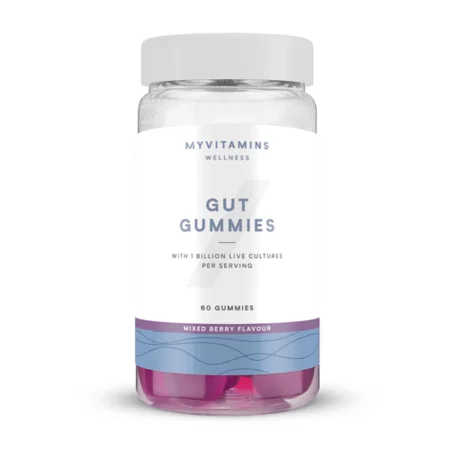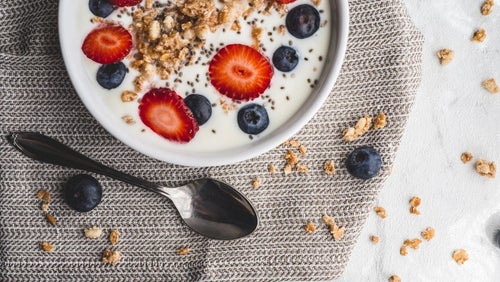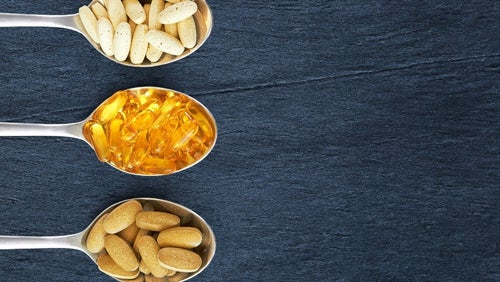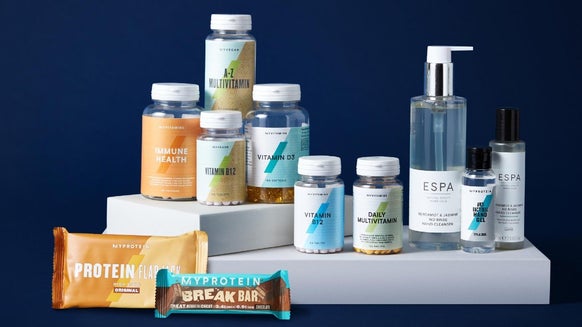Probiotics 101: Everything You Need To Know
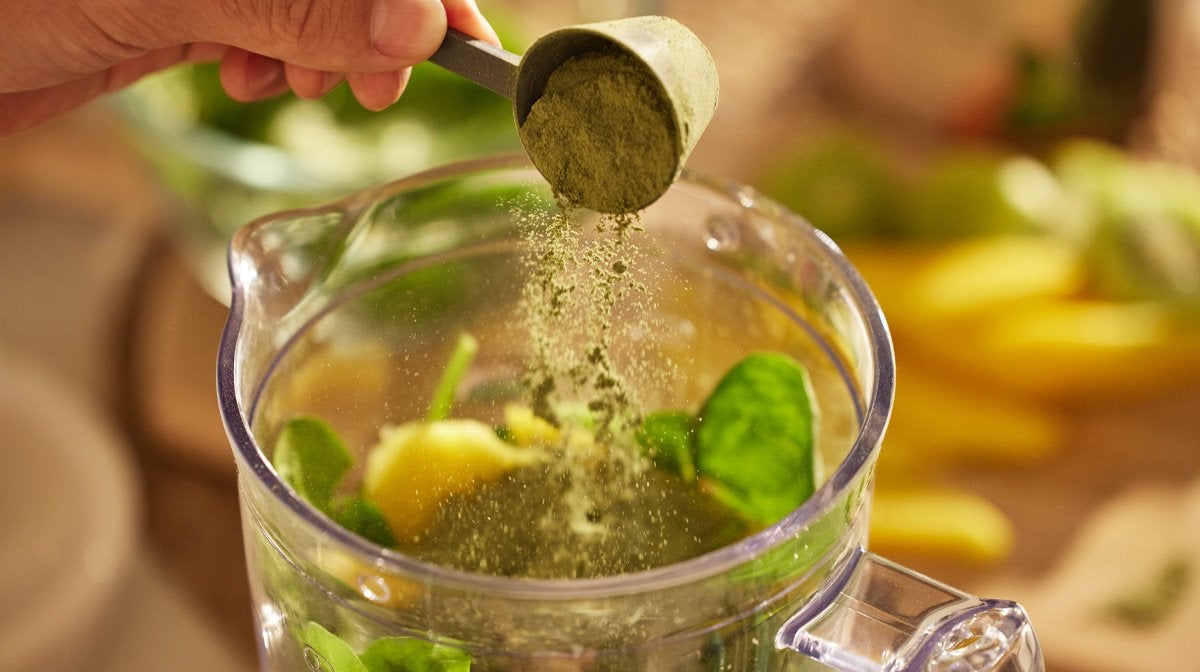
Your gut is home to a collection of living microorganisms (like bacteria and yeast). It is important to maintain a balance of both good and bad bacteria in the gut to support digestive health, but also overall health.
This is where probiotics are incredibly useful.
- What are probiotics?
- How do probiotics work?
- Types of probiotics
- Benefits of probiotics
- Probiotic supplements
- What's the different between prebiotic and probiotic?
What are probiotics?
Probiotics are ‘friendly’, or beneficial, bacteria which can be found in food and supplements.Literally translated as “for life”, probiotics are defined by the World Health Organisation as “live microorganisms which when administered in adequate amounts confer a health benefit on the host” (1).
How do probiotics work?
Probiotics are live bacteria and are intended to reach the gut alive, although the efficacy of different supplements vary. They work to restore and maintain the balance of bacteria within the gut. An imbalance in good and bad bacteria can cause dysbiosis, which is associated with symptoms such as bloating and changes to bowel movements (2, 3).
- Inhibiting pathogens (harmful bacteria, viruses and other microorganisms) from sticking to the gut wall (4)
- Altering the pH balance in the gut, again inhibiting the growth of pathogens (5)
- Creating a healthy balance of gut bacteria

Types of probiotics
Each species of probiotic in your gut provides different benefits, so the more diverse our gut microbiome is, the more benefits you can experience.
There are different species of bacteria and types of yeast that make up the three primary probiotics on the market, these are:
- Bifidobacterium (bacteria)
- Lactobacillus (bacteria)
- Saccharomyces boulardii (yeast)
There are many different strains of these primary probiotic species.
When you check out a label on probiotic supplements or foods, you’ll often see names like “L. acidopholus” or “B. breve” which indicate the species (B for bifidobactirum, L for lactobacillus).
These probiotics are often found in foods that have been fermented, and the specific strain of bacteria or yeast might vary. This article talks more about the seven best probiotic foods.
How do I know which type of probiotic I need?
If you’re considering taking a probiotic supplement, speak to your healthcare provider to confirm if they’re suitable for you and your goal.
What is the most effective probiotic?
The most widely investigated probiotics and ones for which health benefits have been established are within the Lactobacillus and Bifidobacterium species, which are commonly added to yoghurt and fermented milk drinks.
Due to the various strains and species of probiotic bacteria available and their potential benefits, no single probiotic has been identified as the best or most effective overall.

Benefits of probiotics
Each type of probiotic works a little differently based on its chemistry, and therefore can provide different benefits, such as:
Supports Digestion
Probiotics can help support the natural balance of bacteria in our gut.
An imbalance in this bacteria can cause dysbiosis, which is associated with symptoms such as bloating and changes to bowel movements (6).
There is some evidence that probiotics can be helpful in some cases of irritable bowel syndrome (IBS) too (7).
Immunity
As probiotics pass through the body, they attach to the lining of the intestine, and this attachment is thought to prevent pathogenic bacteria, or bad bacteria that can cause illness from attaching itself and therefore infecting us (4).
Specifically, Lactobacillus and Bifidobacterium probiotic species produce different types of acid which can lower the pH balance within the intestine, which inhibits the growth of pathogenic bacteria (5).
Reduced Risk of Metabolic Diseases
Probiotics can influence metabolism, and evidence has shown that they can help to reduce the risk of metabolic diseases such as diabetes and cardiovascular disease.
A randomised control trial found that Lactobacillus gasseri SBT2055 (L.gasseri), a type of probiotic, supported a reduction in abdominal adiposity (8), which is considered a marker for type 2 diabetes, cardiovascular diseases, cancers, and total mortality (9).
Other parameters such as total body fat mass and BMI also significantly decreased, which were not seen within the control group.
When participants stopped taking the supplement, the results were reduced, suggesting that regular consumption may be required.
A review of multiple studies identified that probiotic supplementation in individuals who have metabolic syndrome resulted in improvements of blood pressure, glucose metabolism, and lipid profile in some studies (10).

Probiotic supplements
The most common reason for people to take a probiotic supplement is to help restore the natural balance in the gut after being ill.
Antibiotics not only target the harmful bacteria causing an infection, but they can impact the levels of the good bacteria in the gut and so taking a probiotic can help to replenish the levels of healthy bacteria in the gut.
Probiotics may also improve conditions such as bowel habits (11), thrush (12) and even mental health (13, 14).
However, probiotic supplements are not the only way to support your gut health - there are also many probiotic foods that are available.
Many of these foods are either fermented (like kimchi or sauerkraut) and others have probiotics added during processing.
Get a full list of the best probiotic foods here.
What’s the difference between probiotic and prebiotic?
Put simply, probiotics are the beneficial bacteria, and prebiotics act as the fertiliser.
Prebiotics are a type of fibre that promotes the growth and colonisation of probiotics.
Prebiotics stimulate the growth of different species of bacteria and consequently have an ability to positively modify our gut microbiota (15) and evidence suggests that the joint use of the probiotics with prebiotics increases the survival, and hence the efficiency, of probiotics (16).

Take home message
Both pro- and prebiotic supplements have been shown to have positive effects on the gut microbiome, general health and even in specific conditions, however, more research is required to clearly identify what probiotic strain is most effective for certain results.
Nonetheless, you can still benefit from including probiotic and prebiotic foods within your diet daily to support the balance of bacteria in your gut.
Speak to your healthcare provider for bespoke information about which probiotic supplement might suit you best.
READ THESE NEXT:

Minimise Bloating & Support Gut Health With Nutritionist Approved Supplements
#guttok has got nothing on Katie.

- FAO/WHO. (2001). Evaluation of health and nutritional properties of powder milk and live lactic acid bacteria. Food and Agriculture Organization of the United Nations and World Health Organization Expert Consultation Report, 1-34.
- Lozupone, C. A., Stombaugh, J. I., Gordon, J. I., Jansson, J. K., & Knight, R. (2012). Diversity, stability and resilience of the human gut microbiota. Nature, 489(7415),
- 220–230. https://doi.org/10.1038/nature11550
- Quigley, E. M. (2022). Clinical trials of probiotics in patients with irritable bowel syndrome: some points to consider. Journal of Neurogastroenterology and Motility, 28(2), 204.
- Scarpellini, E., Cazzato, A., Lauritano, C., Gabrielli, M., Lupascu, A., Gerardino, L., … & Gasbarrini, A. (2008). Probiotics: which and when?. Digestive Diseases, 26(2), 175-182.
- Markowiak, P., & Śliżewska, K. (2017). Effects of probiotics, prebiotics, and synbiotics on human health. Nutrients, 9(9), 1021.
- Lozupone, C. A., Stombaugh, J. I., Gordon, J. I., Jansson, J. K., & Knight, R. (2012). Diversity, stability and resilience of the human gut microbiota. Nature, 489(7415),
- 220–230. https://doi.org/10.1038/nature11550
- Quigley, E. M. (2022). Clinical trials of probiotics in patients with irritable bowel syndrome: some points to consider. Journal of Neurogastroenterology and Motility, 28(2), 204.
- Kadooka, Y., Sato, M., Imaizumi, K., Ogawa, A., Ikuyama, K., Akai, Y., … & Tsuchida, T. (2010). Regulation of abdominal adiposity by probiotics (Lactobacillus gasseri SBT2055) in adults with obese tendencies in a randomized controlled trial. European journal of clinical nutrition, 64(6), 636-643.
- Gagnon, E., Pelletier, W., Gobeil, É., Bourgault, J., Manikpurage, H. D., Maltais-Payette, I., … & Arsenault, B. J. (2022). Mendelian randomization prioritizes abdominal adiposity as an independent causal factor for liver fat accumulation and cardiometabolic diseases. Communications Medicine, 2(1), 130
- Tenorio-Jiménez, C., Martínez-Ramírez, M. J., Gil, Á., & Gómez-Llorente, C. (2020). Effects of Probiotics on Metabolic Syndrome: A Systematic Review of Randomized Clinical Trials. Nutrients, 12(1), 124. https://doi.org/10.3390/nu12010124
- Hempel S, et al. (2012). Probiotics for the prevention and treatment of antibiotic-associated diarrhea: A systematic review and meta-analysis. https://jamanetwork.com/journals/jama/fullarticle/1151505
- Mundula, T., Ricci, F., Barbetta, B., Baccini, M., & Amedei, A. (2019). Effect of Probiotics on Oral Candidiasis: A Systematic Review and Meta-Analysis. Nutrients, 11(10), 2449. https://doi.org/10.3390/nu11102449
- Wang H, Lee IS, Braun C, Enck P. Effect of Probiotics on Central Nervous System Functions in Animals and Humans: A Systematic Review. J Neurogastroenterol Motil. 2016;22(4):589-605. doi:10.5056/jnm16018
- Mohammadi AA, Jazayeri S, Khosravi-Darani K, et al. The effects of probiotics on mental health and hypothalamic-pituitary-adrenal axis: A randomized, double-blind, placebo-controlled trial in petrochemical workers. Nutr Neurosci. 2016;19(9):387-395. doi:10.1179/1476830515Y.0000000023
- Chung, W. S. F., Meijerink, M., Zeuner, B., Holck, J., Louis, P., Meyer, A. S., … & Duncan, S. H. (2017). Prebiotic potential of pectin and pectic oligosaccharides to promote anti-inflammatory commensal bacteria in the human colon. FEMS microbiology ecology, 93(11), fix127.
- Mäkeläinen, H., Forssten, S., Saarinen, M., Stowell, J., Rautonen, N., & Ouwehand, A. (2010). Xylo-oligosaccharides enhance the growth of bifidobacteria and Bifidobacterium lactis in a simulated colon model. Beneficial Microbes, 1(1), 81-91.
